Somewhere in the future, when the definitive history of the alliance between academic psychiatrists and the pharmaceutical industry is finally written, this exchange between Dr. Joseph Biederman of Harvard and a lawyer in a suit against Janssen [J&J] in 2009 will surely be a featured exhibit:
But these were not just idle words. Dr. Biederman arrived at Harvard from Israel as a fellow in psychiatry in 1977, and began a brisk ascent up the academic ladder:
His productivity as an author of academic articles soon became legend – becoming a top cited author for the 1990s:
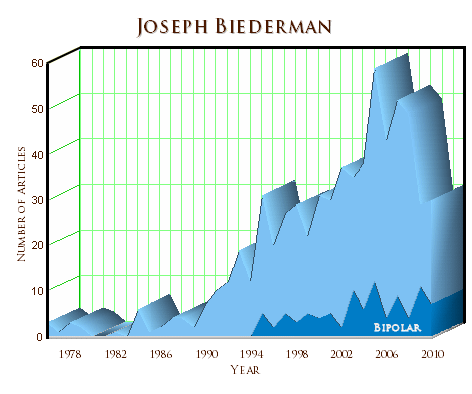
In 1995 [the year he made full professor], Biederman turned his attention to pediatric Mania and childhood Bipolar illness. I was going to review Biederman’s work on pediatric bipolar disorder before looking into his relationship with the pharmaceutical companies, so I spent several frustrating days perusing the articles that I can access by he and colleagues Janet Wozniak and Stephen Faraone. I’m not a child psychiatrist, and that hampers my ability to follow them. With no cases in my mind, I have no points of reference to help me understand what I’m reading. So I’m going to pass on evaluating their work except to mention one thing that particularly bothered me. The papers speak of DSM diagnoses as if they
really are discrete diseases and the listed descriptive criteria
really are based on hard facts. As an example, in explaining that some 90% of kids thought to have pediatric bipolar disorder also have ADHD [are
comorbid], Dr. Biederman
writes:
One problem facing studies of ADHD and mania is that these disorders share diagnostic criteria. Of seven DSM-III-R criteria for a manic episode, three are shared with the DSM-III-R criteria for ADHD: distractibility, motoric hyperactivity, and talkativeness. To avoid counting symptoms twice toward the diagnosis of both ADHD and mania, two different techniques of correcting for overlapping diagnostic criteria have been used to evaluate the association between ADHD and pediatric mania. In the subtraction method, overlapping symptoms are simply not counted when making the diagnosis. In the proportion method, overlapping symptoms are not counted, but the diagnostic threshold is lowered to require that the same proportion of symptoms from the reduced set is required for the original diagnosis. Using these methods, showed that 48% of children with mania continued to meet criteria by the subtraction method, and 69% by the proportion method. Eighty-nine percent of children with mania maintained a full diagnosis of ADHD using the subtraction method, and 93% maintained the ADHD diagnosis by the proportion method. Taken together, these results suggest that the comorbidity between ADHD and pediatric mania is not a methodological artifact due to diagnostic criteria shared by the two disorders.
I just can’t take that seriously. It’s too removed from reality for me to see as anything more than wordplay – quaisi-mathematical manipulations of symptom lists created by committees [Biederman was on one of those committees]. All my mind will do is mutter sarcasms like "evidence-based medicine – ha!." And all I can say after reading the articles is that I can sure see why people often add the word "controversial" to "pediatric bipolar." I’ll just move on to Dr. Biederman’s relationship with Janssen [Johnson & Johnson] and leave pediatric bipolar disorder for the fully initiated.
The Janssen story is sort of strange. In the style of his contentious exchange in the deposition above, it starts with something of a tantrum:
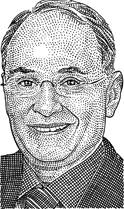
After getting turned down for a grant, Biederman had a fit. "
Dr. Beiderman is not someone to jerk around. He is a very powerful national figure in child psych and has a very short fuse." This is the part that struck me, "
Dr. Biederman is head of adolescent psych at MGH. Since that time, our business became non existant within his area of control." That was a few years earlier. So now in 1999, Janssen was apparently balking at paying him a stiff fee for a Grand Rounds program at UConn, and Biederman is having yet another fit. "
… we have jerked him around. I am truly affraid of the repercussions." Apparently, the fee had been promised by a Janssen rep who was "
… doing everything she could think of to get Dr. Biederman back in our graces."
In those years around the turn of the century, academic psychiatry and the pharmaceutical industry were pretty brazenly playing power games with each other like a bunch of street gangs. Charles Nemeroff at Emory was the "boss of bosses," throwing David Healy under the bus for talking about the SSRIs and suicide. He and Stanford’s Alan Schatzberg had a pharmaceutical company’s ghost-written textbook – from the same firm that ghost-wrote Brown’s Martin Keller’s infamous Study 329. Richard Borison at the Medical College of Georgia had been sent to prison for a Research Center scam. UT Southwestern’s TMAP was up and running in Texas, creating a huge market for the Atypical Antipsychotics [without scientific basis]. That kind of alliance between academia and industry was the order of the day – obviously fueled from both sides of the fence. Meanwhile, the psychiatric literature was being flooded with studies that were more marketing pieces than science. So Joseph Biederman at Harvard was hardly alone in wielding his power by black-balling a drug company that had crossed him.
But this is the comment that I think really speaks to the problem of the times, "He now has enough contracts with Lilly to keep his entire group busy for years." You don’t get to be a full professor at Harvard without having a lot on the ball. But in the era we’re looking at, contracts with pharmaceutical companies were an essential ingredient to the kind of success chronicled by Dr. Biederman’s C.V. and publication record. That had become the royal road to being one step removed from "God." Biederman’s fractious persona isn’t particularly appealing in camera, but, as the above email documents, it was obviously an asset in the halls of academic psychiatry where he reigned. And as we will see, this earlier pique with Janssen may well have served him later in negotiations about Harvard’s J&J Center for Pediatric Psychopathology…

 After getting turned down for a grant, Biederman had a fit. "Dr. Beiderman is not someone to jerk around. He is a very powerful national figure in child psych and has a very short fuse." This is the part that struck me, "Dr. Biederman is head of adolescent psych at MGH. Since that time, our business became non existant within his area of control." That was a few years earlier. So now in 1999, Janssen was apparently balking at paying him a stiff fee for a Grand Rounds program at UConn, and Biederman is having yet another fit. "… we have jerked him around. I am truly affraid of the repercussions." Apparently, the fee had been promised by a Janssen rep who was "… doing everything she could think of to get Dr. Biederman back in our graces."
After getting turned down for a grant, Biederman had a fit. "Dr. Beiderman is not someone to jerk around. He is a very powerful national figure in child psych and has a very short fuse." This is the part that struck me, "Dr. Biederman is head of adolescent psych at MGH. Since that time, our business became non existant within his area of control." That was a few years earlier. So now in 1999, Janssen was apparently balking at paying him a stiff fee for a Grand Rounds program at UConn, and Biederman is having yet another fit. "… we have jerked him around. I am truly affraid of the repercussions." Apparently, the fee had been promised by a Janssen rep who was "… doing everything she could think of to get Dr. Biederman back in our graces." 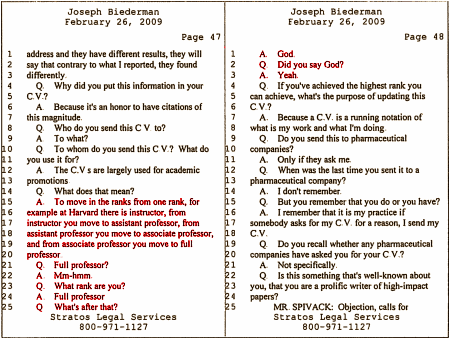
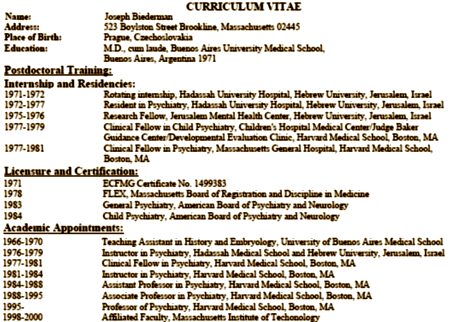
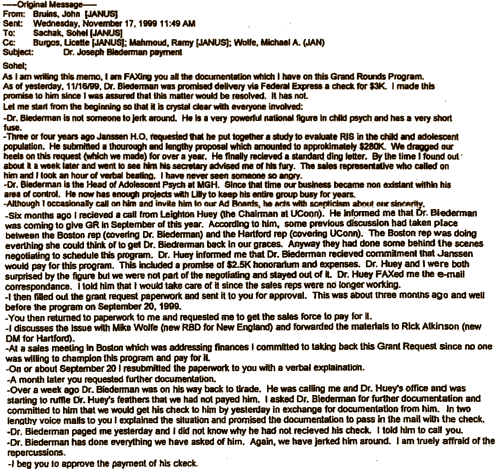
What astonishes me about this stuff is how similar it is to what the Wall Street goons were doing in the subprime mortgage and securities fiasco. That is, having one big penis measuring contest and going for power grabs simply because they COULD. The selfishness is downright sociopathic, which is depressingly the zeitgeist of all social strata in this country (sigh). Actually doing their jobs or helping people (gasp!) wasn’t even on the radar and the public bought it, whether it be Wall Street or psychiatry. It really is all the same thing, and still no one in either Wall Street or psychiatry has been brought to justice. And even more frightening is few seem to care.
How is this not a sign of an empire in imminent decline?
I tells ya: as a 20-something caught up in the psychiatric patient scam, one of the few things that keeps me going is my morbid curiosity about just how psychiatry will be thought about in 20,30 years when the definitive history of this period of psychiatry is written.
Here’s the title of a future book that would sum it up rather succinctly for me:
“Whores and cowards: how psychiatry pimped and hid as market forces shoved biological paradigms down the throats of American citizens who deserved better”
Now, I’ve actually read some of Dr. Biederman’s papers and have found them to be measured and thoughtful. I don’t think he’s the big bogeyman — and I thought the answer “God” to the attorney (who probably thought HE was God) was funny.
Hmmm… Dx bipolar II as an adult, dx ADD in addition much later (by a neuropsychiatrist and colleagues through testing and interviews, at the behest of my psychiatrist). Not hyper per se, just curious if at least some of the clinical criteria line up.